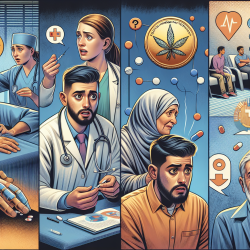The Alarming Reality of Opioid-Impaired Providers
The opioid crisis has reached a point where it not only affects patients but also the very providers entrusted with their care. The research article titled The opioid-impaired provider: A call for national guidance to maximize rehabilitation while protecting patient safety sheds light on this pressing issue, urging for national guidance to balance rehabilitation and patient safety.
Understanding the Impact on Healthcare Providers
Healthcare providers, including speech-language pathologists, are not immune to the opioid epidemic. The prevalence of substance use disorders among medical professionals poses a significant risk to patient safety. The article highlights the need for structured rehabilitation programs that ensure providers can safely return to practice without compromising patient care.
Data-Driven Insights for Practitioners
For practitioners in speech-language pathology and other fields, the research emphasizes the importance of data-driven decisions. By understanding the patterns and risk factors associated with opioid impairment, practitioners can implement preventative measures and support systems within their practice. Here are some key takeaways:
- Early Identification: Recognizing the signs of opioid impairment early can prevent potential harm to patients.
- Structured Rehabilitation: Programs should be designed to facilitate the safe reintegration of impaired providers into their professional roles.
- Support Systems: Establishing robust support networks within healthcare settings can aid in the recovery and ongoing monitoring of affected providers.
Encouraging Further Research and Action
While the article provides a foundational understanding of the issue, it also calls for further research to develop comprehensive national guidelines. Practitioners are encouraged to contribute to this body of knowledge by exploring the following areas:
- Longitudinal Studies: Researching the long-term outcomes of rehabilitation programs for opioid-impaired providers.
- Policy Development: Collaborating with policymakers to create effective guidelines that prioritize both rehabilitation and patient safety.
- Interdisciplinary Approaches: Leveraging insights from various healthcare disciplines to create holistic solutions.
Conclusion: A Call to Action
The opioid crisis is a multifaceted challenge that requires a concerted effort from all stakeholders in the healthcare industry. By focusing on data-driven solutions and fostering a culture of support and rehabilitation, we can protect patient safety while providing a pathway for impaired providers to recover and thrive.
To read the original research paper, please follow this link: The opioid-impaired provider: A call for national guidance to maximize rehabilitation while protecting patient safety.










